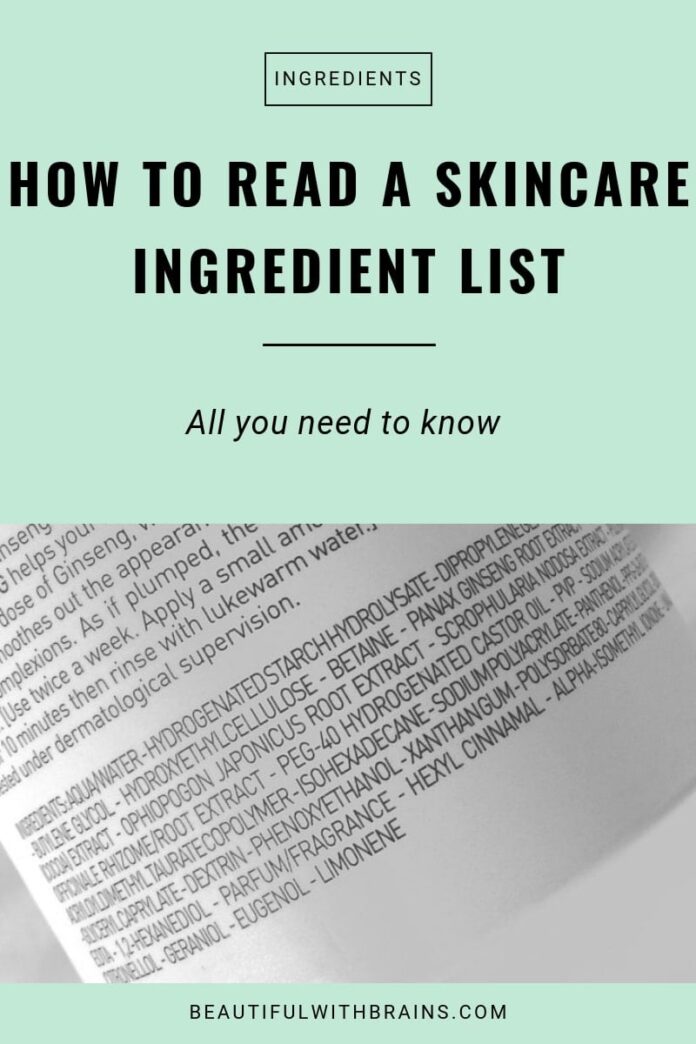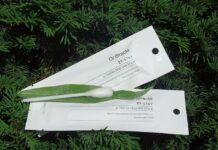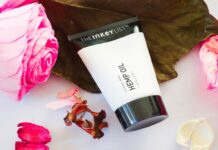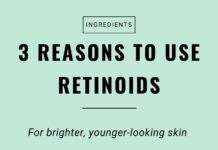[ad_1]
Ever puzzled how you can learn a skincare ingredient listing? The regulation is obvious: magnificence merchandise should declare their components on the packaging. It’s to maintain you protected. If you recognize one thing’s in there’s dangerous for you, you gained’t purchase it. Disaster averted. Besides…
How on earth are you imagined to make sense of that incomprehensible lengthy listing of chemical compounds? It’s not like anybody ever bothered to clarify to you what butylene glycol or DMDM hydantoin are and if they need to or shouldn’t be there. And why are they making shea butter sound like sperm? Can’ they simply say “shea butter” as a substitute of “Butyrospermum Parkii”? Guess that will be too straightforward.
If you happen to can’t make sense of it, you gained’t pay any consideration to it. You’ll ignore the listing and shell out the bucks for a cream that provides you a nasty rash. Rattling it! Why is life by no means straightforward? Whereas we’re all ready for regulators to understand we’re not all beauty scientists or politicians to present us a greater training (wouldn’t it’s enjoyable to study beauty science in class?), listed here are a couple of ideas and methods that will help you make sense of these hieroglyphics known as ingredient lists:
Why Ought to You Learn Skincare Ingredient Lists?
Skincare ingredient lists are tremendous boring. However there are a couple of the reason why it’s a good suggestion to present them no less than a fast look. Right here’s why:
- Sensitivities and allergy symptoms: If you happen to’re allergic or delicate to an ingredient, an in depth have a look at the ingredient listing will ensure you depart something that comprises the culprits on the cabinets and keep away from a nasty response.
- Private selection: A few of you might dislike the texture of silicones or the harshness of surfactants, for instance. If you happen to can learn the ingredient listing, you possibly can go for options that higher fit your tastes, wants and values.
- Effectiveness: Does a serum actually comprises sufficient vitamin C to spice up collagen or is there only a drop in it for advertising and marketing functions? The ingredient listing will let you know.
- Dupes: If you happen to can work out what components make a product work they means it does, you possibly can search for cheaper options (or you possibly can take a look at my dupes list, as a substitute).
The place Do You Discover The Ingredient Listing Of Skincare Merchandise?
Yow will discover a product’s components listing in a couple of locations:
- Again of the packaging (most typical)
- On the field
- Within the leaflet
- Beneath the product label or barcode (observe the arrow – it’s going to level you on to it)
How To Learn A Skincare Ingredient Listing
Now that you recognize the place to search out the ingredient listing, let’s work out how you can learn it. Listed here are a couple of guidelines to remember:
1. Names of components
Ever puzzled why these names are so difficult? It’s as a result of they observe the Worldwide Nomenclature of Beauty Substances (INCI) system (as a result of if each nation had its personal system, it’d be much more complicated!) In response to the INCI system, components should be named utilizing their scientific and, for crops, Latin names. For instance, desk salt is listed as Sodium Chloride. Argan oil is argania spinosa kernel oil. Complicated a lot?
P.S. The English names are sometimes put in parenthesis to can help you decipher them a bit extra simply.
2. Order of components
As a rule, you want a beneficiant dollop of an ingredient for it to work its magic. If you happen to put solely a drop of two, they gained’t do a lot for you (retinol is a notable exception). However how will you inform if the model has skimped in your treasured vitamin C or inexperienced tea? Take note of the order of components The Federal Commerce Fee dictates that components should be listed so as of focus, from the very best to the bottom.
“Usually solely the highest ‘energetic components’ are required to reveal percentages,” explains board-certified dermatologist Dr. Rachel Nazarian. “As a result of every little thing else on the ingredient label is solely listed so as of focus, search for the ingredient you need to be nearer to the start of the listing, quite than close to the tip. This works the alternative means as nicely. If an ingredient that doesn’t mesh nicely along with your pores and skin is listed throughout the first three components, go for one other product.”
WARNING! I’m seeing lots of merchandise recently that declare to include 5% retinol or retinoids. If these claims had been true, your pores and skin shall be severely irritated by the product. It is a case the place manufacturers idiot you into believing you’re getting the next dose for higher outcomes, when in actuality, you’re getting a a lot, a lot smaller dose (1% or much less). How is that this authorized? Easy. They include a BLEND of retinol. For instance, RetiSTAR™ is made up of retinol, tocopherol, sodium ascorbate, PEG-40 Hydrogenated Castor Oil, caprylic/capric triglycerides. If you happen to see 5% RetiSTAR™, you’re NOT getting 5% retinol. 5% is the concentrations of all these components mixed. The precise quantity of retinal is way much less – and one your pores and skin can tolerate.
Exceptions:
- Substances which can be current at a focus under 1% may be listed in any order.
- Color components, it doesn’t matter what their concentrations are, may be listed in any order, in spite of everything the opposite non-color additive components (normally, you discover these on the very backside).
- Within the case of medicine (like sunscreens), the energetic components should be listed earlier than the opposite components.
Associated: What’s The Difference Between A Cosmetic And A Drug?
3. Recognizing Low concentrations
You now know that something that’s current at concentrations of 1% or much less may be listed in any order. However, how are you aware the place the concentrations begin to be this low? There isn’t a exact rule, however there are a number of tips:
- The rule of 5: normally, it’s the primary 5 components that make up the majority of the system – normally about 80%. From sixth onwards, concentrations begin to be low.
- Preservatives: these are utilized in 1% of much less, so something that comes after them shall be current in hint quantities, too.
- Perfume: ditto. Something that comes after fragrance is at 1% on the most.
- Pure fluff: in the event you see a listing of chemical compounds on the prime adopted by a bunch of pure extracts, you recognize the latter is there only for present. All that pure goodness gained’t do an excessive amount of for you.
Extra isn’t at all times higher. 15% Vitamin C offers you higher outcomes than 5% Vitamin C. However 20% retinol will severely harm your pores and skin! You gained’t discover greater than 1% retinol in skincare merchandise – cos you don’t want the next dose to see outcomes. It’s not how a lot of an ingredient is in a product, however whether or not there’s sufficient of that ingredient for it to work.
Associated: The Battle Of Preservatives: Which Is The Best Alternative To Parabens?
4. “And different components”
Have you ever ever seen that some labels use the phrase “and different components”? It signifies that sure components are thought of “commerce secrets and techniques” and don’t must be revealed on the ingredient listing. Fragrance is the right instance. Any perfume is made up of 100 components or extra. Most of them are innocent, however some are recognized allergens. But, if everybody knew what’s in Chanel n.5, for instance, it’d be solely a matter of time earlier than somebody copied it. Secrecy’s wanted to guard the system.
Exception:
If a fragrance comprises recognized allergens (and nearly all of them do), these should be disclosed on the packaging. Often, they’re on the finish. You’ve most likely seen them usually. Examples embody limonene and linalool.
If You Have Delicate Pores and skin And Are Susceptible To Dangerous Reactions
You probably have rosacea, eczema, or delicate pores and skin that reacts badly to lots of skincare merchandise, listed here are a few ideas that may enable you additional make sense of ingredient lists:
1. Look For Shorter Ingredient Lists
Extra components doesn’t imply a greater efficiency. Similar to fewer components doesn’t imply the product doesn’t work in addition to one thing that has 30 components. The variety of components tells you nothing about how good a product is. You possibly can create a really efficient moisturiser with solely 5 components or with 50. You possibly can create a crappy serum with solely 5 components or with 50. BUT, in case you have delicate pores and skin, the extra components a product has, the upper the probabilities certainly one of them will trigger an irritation. Choosing merchandise with shorter ingredient listing may also help minimise the prospect of a detrimental response – however you continue to want to verify these few components aren’t problematic.
2. Beware Of Free-From Claims
“Free-From” claims don’t enable you keep away from irritants. Fairly the alternative, they’re very deceptive. I’ll by no means perceive why manufacturers proudly proclaim they’re free from innocent components like silicones and parables after which fill their merchandise with irritating important oils. I’ve written a lot of articles about why chemical doesn’t equal dangerous and pure doesn’t equal good – and different bogus claims the wonder business wish to make. If you’re curious to know more, click here.
However, right here’s what I would like you to know: in case you have delicate pores and skin, don’t belief Free-From declare. Simply because an ingredient made that listing, it doesn’t imply it’s dangerous in your pores and skin. And what everybody swear is nice may very well irritate your pores and skin. I’ve a lot of purchasers who’re illiberal to pure components, like important oils, and even anti-aging superstars like niacinamide. You probably have allergy symptoms, you’re significantly better off wanting by way of an ingredient listing to verify the set off isn’t there than counting on any claims the product makes.
Is It Price Studying A Skincare Ingredient Listing After All?
Skincare ingredient lists have their limitations. Manufacturers don’t at all times let you know how a lot of an ingredient is within the system, or they trick you into believing there’s extra of it than it really is… And, after all, formulations matter too. a skincare ingredient listing shouldn’t be sufficient to know the way nicely a product will give you the results you want. BUT, it’s an ideal place to begin. If you recognize a product comprises an ingredient that’s problematic for you or doesn’t include sufficient of an ingredient your pores and skin wants, you possibly can depart it on the cabinets and make investments your cash in one thing that may really work.
[ad_2]
Source link








